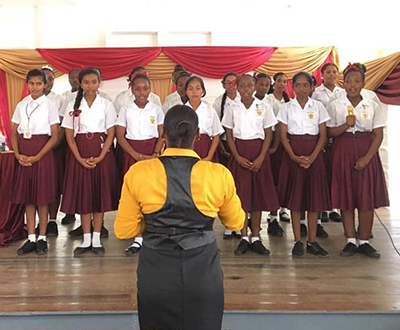By Joshanna Hopkinson
Note from Jasmaine Payne: The wonderful thing about having a column is that you can use this space as a medium to write about myriad content. When I first set out to start this column, it was to encourage writers to continue to write and to provide tips on how they can do so in an environment that provides limited resources to hone their craft. Lately, I have been receiving submissions from writers wishing to showcase their talent and I realised that this column could also serve that purpose. So from time to time, The Write Mind will serve as a space where you can read the work of otherwise unpublished writers in Guyana. Here is the first from Joshanna Hopkinson. Joshanna is a young Guyanese professional who enjoys reading historical fiction and literature that explores the rich and vast culture of the Caribbean. She currently manages her own short story blog, where she publishes flash fiction in a variety of genres. She aspires to eventually publish an anthology of short stories.
 “CHALLENGING.” That’s how Demansea Benjamin-London would describe her experiences as a teacher in the pandemic. Demansea has been a teacher for the past 11 years, the last seven of which were spent at the Rosignol Secondary School. “I moved here because of marriage,” she says, as her eyes flit between the screen and her young children playing in front of her.
“CHALLENGING.” That’s how Demansea Benjamin-London would describe her experiences as a teacher in the pandemic. Demansea has been a teacher for the past 11 years, the last seven of which were spent at the Rosignol Secondary School. “I moved here because of marriage,” she says, as her eyes flit between the screen and her young children playing in front of her.
Like many other teachers across Guyana, she has been forced into distance teaching because of the government-mandated school closure since March 16, 2020. It’s the reality of living in a world with COVID-19, the highly contagious respiratory illness that has caused a global lockdown. When the first case of the virus was discovered in Guyana, Demansea, like many other young parents was scared — very scared. “I really prayed a lot,” she says. She started taking extra precautions to ensure her family’s safety by putting diluted bleach and alcohol at her gate and increasing her washing cycle from two to four times a week. Fruits that come from the market are now washed in warm water and bleach. She’s become almost religious about eating her vitamins and eating healthy in general. “It’s kind of traumatic to think about where [my life] was [then] to where it is today,” Demansea admits.
Her daily routine before the pandemic wasn’t particularly exciting. It’s a typical of any Guyanese working parent: “I would press in the evenings then get up around 04:30hrs to do devotion. Then I would start preparing lunch and breakfast. Get the children up around 06:00hrs, do devotion with them; ensure they eat breakfast, take their baths. Take my bath, [then get everyone off to school].” Now, “the children get up when they get up” and they all stay inside. There’s no more leaving the house or being in a different environment with the opportunity to interact with different people. “I miss socialising with adults. Speaking to colleagues. Being stuck on the inside, there is no break, ” she says.
She misses her students too. At Rosignol Secondary, she’s the Bible Club Leader, the choir director and the school welfare liaison officer. She also hosts a mini-counselling corner for students seeking a listening ear. It’s a lot to do, in addition to the four subjects she teaches, but she enjoys all of it. Her face lights up as she describes her students leading Bible Club or hosting the audition season for the choir. Now in the pandemic, these activities are on hold. Students have sent messages, indicating their disappointment about not being able to sing in the choir or fellowship together in Bible Club sessions or just come to her for a lunchtime chit-chat. “It’s worrisome [for me] that I’m not able to do what I really love doing with my students,” she says. Her previously smiling face is now clouded over. “I was actually getting over this,” she continues. 
It’s even more difficult for her first form students transitioning into new schools with new teachers and new classmates that they can only interact with through their phone and computer screens. “They’re doing the work but whether they understand what’s being done [is difficult to tell],” she explains. Many of them are anxious that they may not be able to manage the grade seven curriculum. But she always tries to reassure them that “it’s okay.” It’s a pandemic and the last thing she believes teachers should be doing is putting undue stress on their students. When she gives them exercises, she encourages them to use the full length of time up to the due date, to complete them. “We don’t know the living conditions of some of these children, why should I be heartless and say I need this work at this time,,” she says. interjection
As the teacher, it’s even more difficult for her to connect to these new students she’s never seen before. “[I’m] unable to see their posture to know how to deal with them. [I] can look at someone and depending on their posture or facial expression, know what to say, how to say it or even when to say it and that’s what I’m unable to do-connect with the students.” It’s a difficulty her colleagues lament as well. “Some are distraught that they are unable to communicate with their students the way they should… I know of some colleagues who would be in school up to four or five with their students in school doing work. Those are the ones that [sic] are very much feeling that they can’t meet with their students,” she says. They’re also the ones who were eager for school to reopen so they could reconnect and continue the long and arduous work of education.
Demansea, though passionate about teaching, was not as enthusiastic. When she heard the directive that schools would reopen, her nos were emphatic and consistent. “Some person was saying ‘Demansea like ya record stick, whappen?’,” she recalls with laughter. It’s a dangerous time and currently, the numbers in Guyana are a cause for major concern. But she treks out to Rosignol Secondary School on Mondays and Fridays anyway. Grades 10-12 teachers require assistance to manage their socially distanced classes, so Grades Seven to Nine teachers are called in to assist by supervising the classrooms where the main instructor is absent.
Her children are still at home and their work on Mondays and Fridays still come to her phone. “My mother-in-law will try to assist me in whatever way possible, but I still have to come back home to do it all over again,” she explains. Her son attends Rosignol Primary School and her daughter attends Liberty Hall Nursery. They are babies that have to be stewarded to ensure that they complete their exercises and do their work, but their teachers don’t host virtual classroom sessions so Demansea has to step in to ensure that they’re not lagging. “It’s challenging,” the teacher admits.
But it’s a challenge she encourages her colleagues to do their best in. “Try your best to be as good as you can be. Some teachers are not trying at all and it hurts. I have my two children and I am working with them, but how many parents are able and equipped to do so.” Her words are urgent, but kind, “Try your best to do what you’re doing to the satisfaction of your heart.”
For the students of Guyana, her emphasis is different: “Be safe… All the necessary precautions you can take, take [them]. Death knows and respects no one. Be safe.”




.png)









